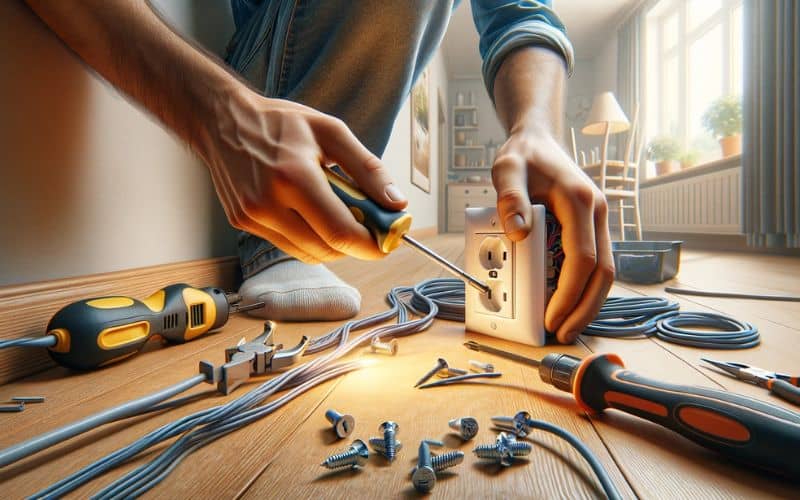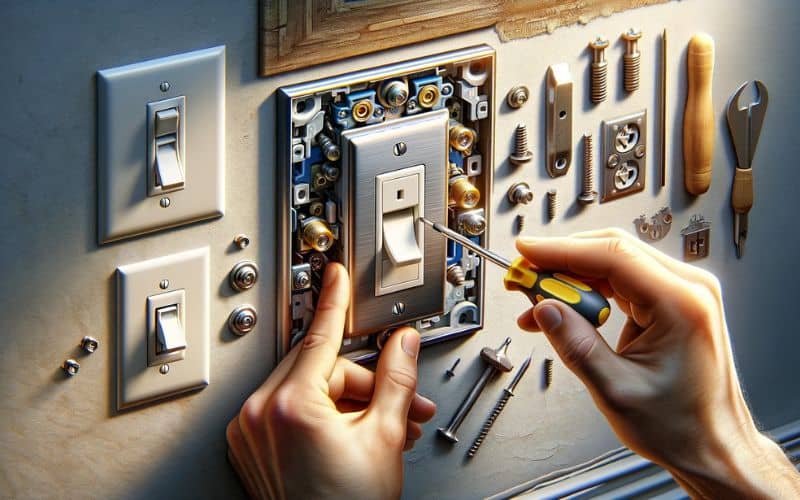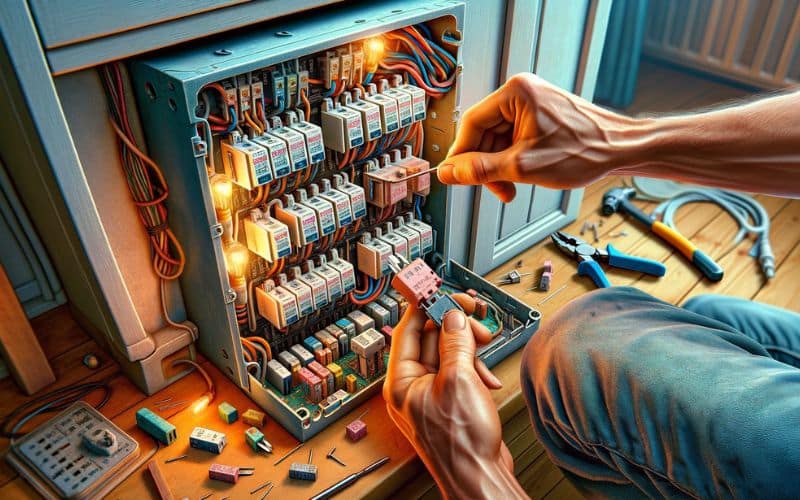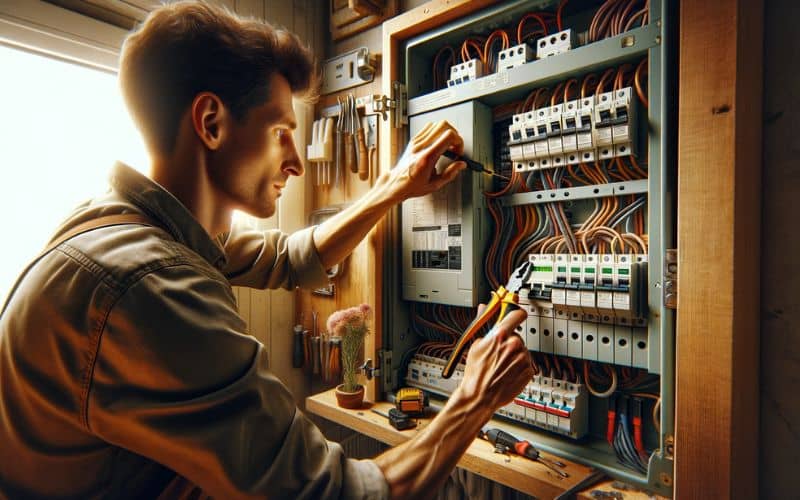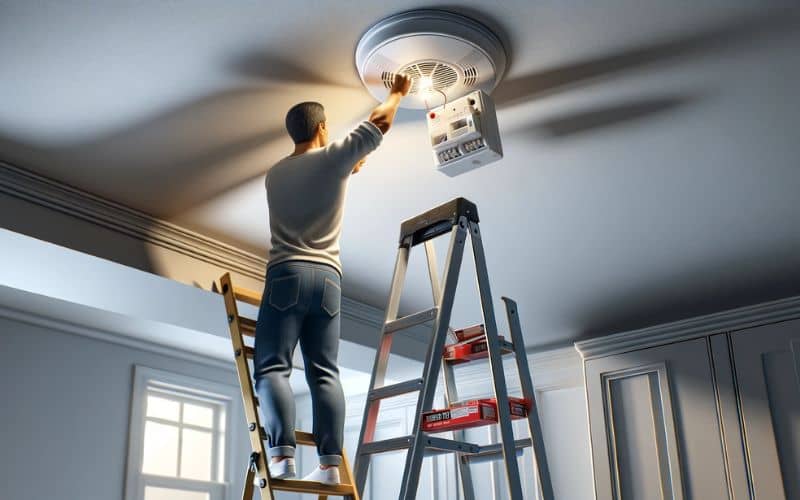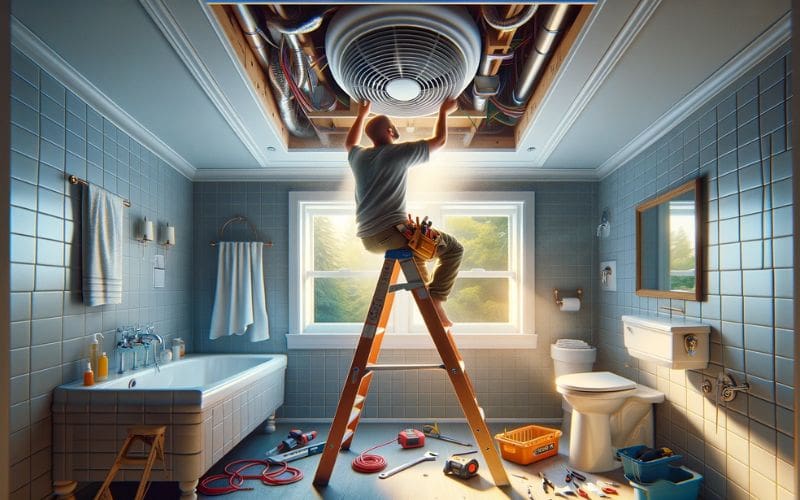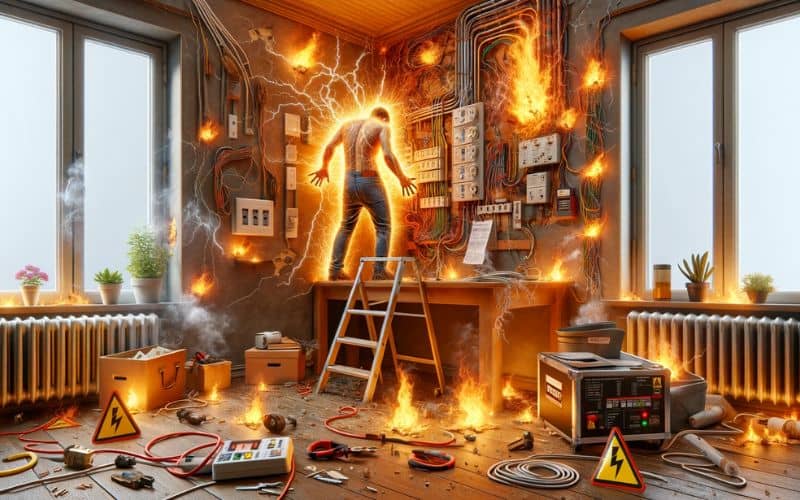What Electrical Work Can Be Done Without a License
Written by Total Power Energy Team
Published:
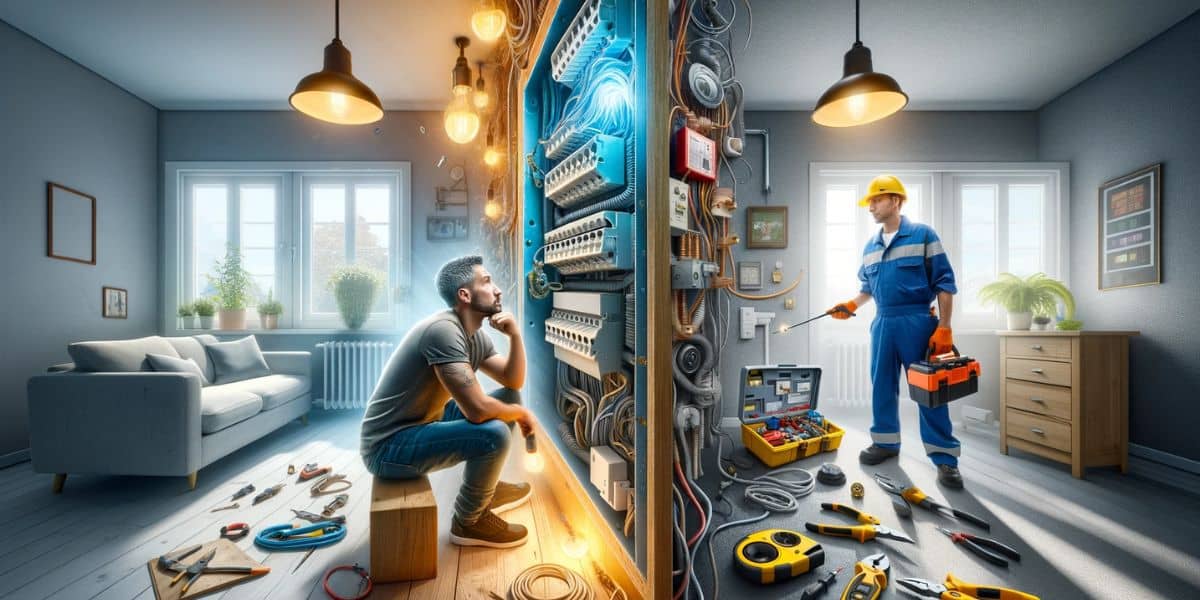
When it comes to electrical work in your home, understanding the boundary between what you can do yourself and what requires a licensed professional is crucial.
Every region has its own set of rules and regulations governing electrical work, and it’s important to familiarize yourself with these to ensure safety and compliance.
Generally, most electrical tasks require a licensed electrician due to the potential risks involved. However, homeowners can do some minor tasks without needing a license.
The regulations regarding electrical work without a license vary, but generally, the rule is that anything beyond basic repairs or replacements requires a professional.
Safe DIY Electrical Tasks (Without a License)
Replacing Light Fixtures
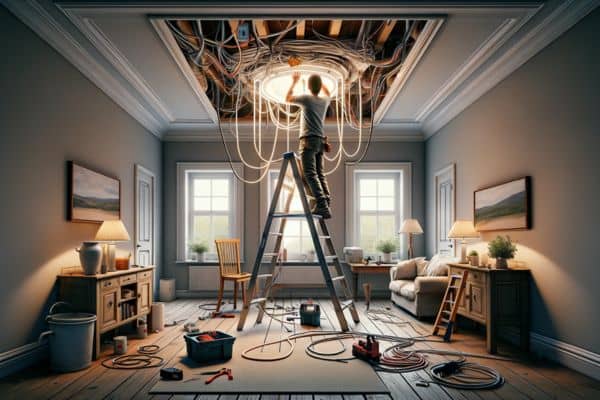
One of the simpler electrical tasks you can do at home is replacing light fixtures.
This can be a straightforward process of removing the old fixture and installing a new one, provided that you follow the manufacturer’s instructions carefully.
Remember, safety first – always turn off the power at the circuit breaker before starting.
Installing Ceiling Fans
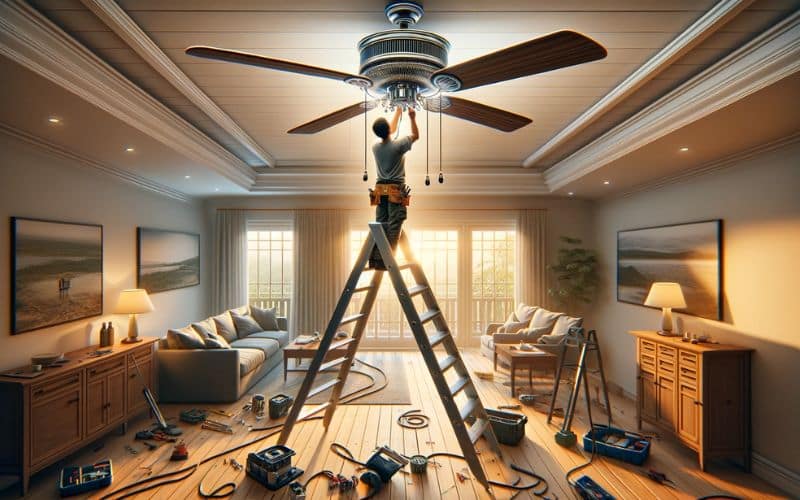
Configuring a ceiling fan is another task that generally doesn’t need a master electrician.
Much like replacing light fixtures, it’s essential to ensure that the power is off and follow the installation instructions provided with your ceiling fan kit.
Replacing Electrical Outlets
Replacing an existing electrical outlet is a task within the grasp of a DIY enthusiast.
It’s crucial, however, to understand the wiring and to ensure that the power is off before beginning this task.
This task does not include Setting up new outlets, which is more complex and requires electrical contractors.
Changing Light Switch Covers
This is a simple task, often undertaken as part of aesthetic upgrades.
It doesn’t involve complex electrical wiring and can be done safely by most homeowners.
Replacing a Fuse in a Fuse Box
Replacing a fuse is straightforward but understanding your home’s electrical circuit is important.
If you’re unsure, consult a professional electrician.
Replacing Circuit Breakers
While replacing the Fuse box can be done by a homeowner, it requires a good understanding of your home’s electrical system.
If you’re not confident in doing this safely, it’s best to call a licensed electrical contractor.
Installing Low-Voltage Outdoor Lighting
Low-voltage outdoor lighting systems are designed for DIY installation.
They are generally safe and easy to Set up, as they operate on a lower voltage than your home’s main electrical system.
Replacing Smoke Detector Batteries
Maintaining your smoke detectors by regularly replacing the batteries is a simple and essential task.
It’s a straightforward process that ensures your home’s electrical safety
Replacing Bathroom Ventilation Fans
Replacing an existing bathroom ventilation fan with a new unit is a manageable task for a DIY enthusiast.
Ensure the power is off and follow the installation instructions carefully.
What is the Fine for Doing Electrical Work Without a License in Washington
Fines for Unlicensed Electrical Work: According to the WAC 296-46B-915, the fines for performing electrical tasks without a valid license start at $1,000 for the first offense.
The fines increase for subsequent offenses: $2,000 for the second offense, $3,000 for the third, and up to $10,000 for further violations.
Employing unlicensed workers for Electrical projects also carries fines, starting at $250 for the first offense and $500 for each subsequent offense.
Detailed information on these fines can be found in the WAC 296-46B-915.
Importance of Hiring a Licensed Electrician for Complex Work
While there are tasks you can safely do, complex electrical work is not among them.
Hiring a professional ensures the work is done to code, protecting your family and investment.
qualified electricians have the training, experience, and tools to handle complicated electrical tasks safely and effectively.
Tasks Requiring a Licensed Electrician

Installing New Outlets or Switches
This is a task that requires a Certified Electrician. It involves complex wiring and must adhere to specific electrical codes.
Repairing or Modifying Existing Wiring
Modifying Cable systems is a complex task that needs an electrical contractor.
It’s not just about skill but also about understanding electrical code requirements.
Working on Electrical Panels
Working on an electrical panel requires an experienced electrician. The risks involved with this task are significant.
Any Work on High-Voltage Systems
High-voltage systems are inherently dangerous and should only be handled by a licensed professional.
What are the Potential Hazards of DIY Electrical Work
Electric Shock: Undertaking Electrician tasks without proper knowledge can lead to electric shock, a serious hazard emphasizing the need for a Registered Electrician.
Fire Hazards: Incorrect Power system tasks can cause fires. This risk highlights why unlicensed work is not just a legal issue but a safety concern.
Property Damage: DIY electrical projects gone wrong can lead to costly property damage, another reason to consider hiring a licensed electrical contractor.
Personal Injury: Injuries can occur when non-professionals engage in electrical work, especially when it involves complex wiring or electrical panels.
Code Violations: Performing electrical work without an electrical license can result in code violations. Adhering to electrical codes is a legal requirement and a safety measure.
Electrocution: The most severe risk of DIY electrical tasks is electrocution, especially in tasks involving high-voltage systems or improper handling of electrical wiring.
Safety Tips for DIY Electrical Work

- Turn off the power: Before starting any electrical task, always turn off the power at the Breaker box.
- Use proper tools: Ensure you have the right tools for the job, and they are in good working condition.
- Wear safety gear: Safety glasses and gloves can offer an extra layer of protection.
- Check for live wires: Use a voltage tester to ensure the cables are not live before you touch them.
- Follow manufacturer’s instructions: Always adhere to the guidelines provided by the manufacturer for any electrical component or tool.
- Avoid overloading circuits: Be mindful of the load on your Cable systems to prevent overheating and potential fire hazards.
- Inspect power cords: Regularly check your power cords for any damage or wear and tear.
- Fasten and protect wiring: Ensure all Cable is securely fastened and protected to prevent accidental damage.
- Avoid damp conditions: Never work with electricity in wet conditions.
- Know your limits: If a task feels beyond your skill level, hiring a professional is wise.
Conclusion
Deciding what electrical work you can do without a license is about balancing your abilities with safety and legal requirements.
While some tasks are suitable for DIY, many require the expertise of a licensed electrician. It’s not worth putting your family or your home at risk.
When in doubt, always opt for the professionalism and safety guarantee of hiring a licensed professional.
Frequently Asked Questions
Can I install a new electrical outlet by myself?
Installing a new electrical outlet typically requires altering the home’s electrical cable and is best handled by a Trained Electrician.
Is it safe to replace a light fixture without an electrician?
Replacing a light fixture is a common DIY electrical task. However, ensure the power is off at the circuit breaker and follow safety protocols.
What should I do if I’m unsure about an electrical task?
If you’re unsure or uncomfortable with an electrical task, consulting with or hiring a Professional Electrician is always safer.
How often should I check my smoke detectors?
Test your smoke detectors monthly and replace the batteries at least once a year, or as the manufacturer recommends.
Total Power energy content Team
Total Power Energy content team provide valuable tips and guidance on electrical information.
Our writers are experienced in the electrical field and produce high-quality content such as electrical safety, installation, repair, etc.
Our goal? To help you work safely and smartly. Our advice is easy to follow whether you’re at home or on the job. Stay safe and confident with our help!

